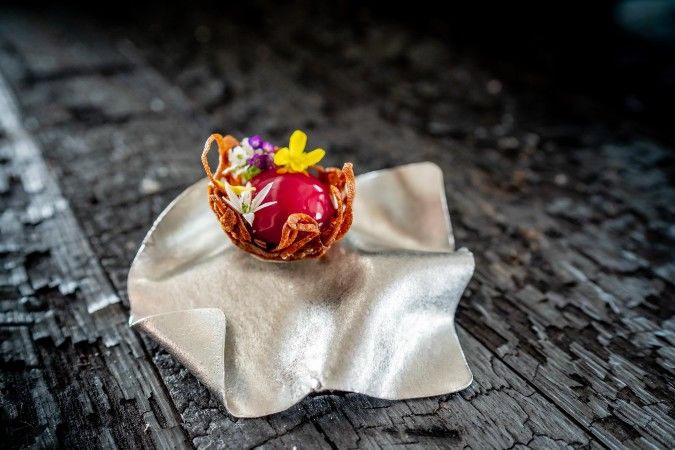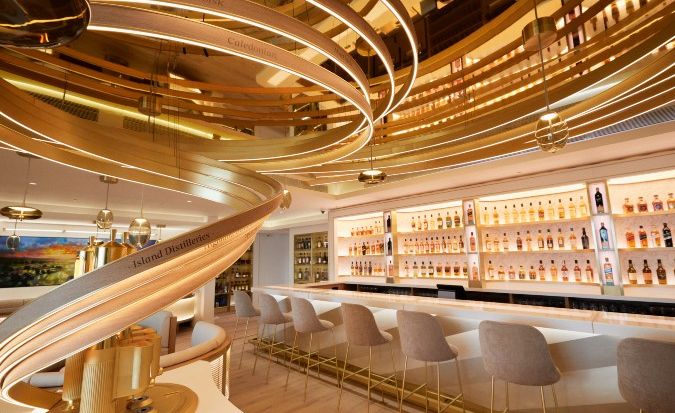Fancy dining in a Michelin-starred distillery maltings, sleeping in a whisky-themed bedroom or kicking back with a rare single malt while taking in the Edinburgh skyline? Welcome to the next generation of premium Scotch whisky experiences. With more than two million people travelling to visit Scotland’s distilleries in 2019, whisky tourism was, pre-pandemic, at an all-time high. But while the numbers were buoyant, the experiences themselves had become somewhat standardised. A tour of the distillery, a dram or two from the basic range, and perhaps a coffee or a sandwich at the on-site café – after exiting through the gift shop, of course, with the attendant offerings of branded baseball caps, golf accessories and picnic blankets.
The reopening of distilleries to the public, however, has coincided with a raft of new ventures offering a more tailored, immersive and all-round premium experience. And just as recent years have seen distilleries’ premium bottlings scale ever more vertiginous heights of rarity and exclusivity, now, it seems, their tourism offerings are finally catching up. With several of these having been delayed to a greater or lesser degree by the restrictions of the past 18 months, Scotch lovers are suddenly spoiled for choice when it comes to luxury Scotch whisky experiences.


Brora
For starters comes the opportunity to witness the rebirth of a historic ‘lost’ distillery. This summer saw the reopening of the iconic Brora in Sutherland, whose rare and extremely limited releases have become collectors’ items since its closure in 1983. As an admirer of Brora’s legacy, and having been fortunate enough to have tasted several expressions over the years, I couldn’t pass up an opportunity to experience the distillery’s regeneration first hand. And just as tasting Brora is a luxury in itself, so is an exclusive tour of the distillery. There are just two options available: Brora Awakened (£300) and The Eras of Brora (£600). I opt for the latter – and since I’m the only visitor today, I have their full, undivided attention. I’m welcomed by the warm smiles of brand home manager Andrew Flatt and distillery manager Stewart Bowman. This is not special treatment, I hasten to add. With tours here by appointment only and conducted in small groups, all visitors to Brora are greeted personally.

From the moment you open Brora’s imposing black wildcat gates, you know you’re somewhere special. The stone walls enclosing the distillery’s cobbled courtyard create a feeling of serenity that’s interrupted only by the occasional hiss or whirr of a nearby pump. The extensive renovation is sympathetically done, and without the constant murmur of the crowds usually encountered at Scotland’s most popular distilleries, it’s easy to imagine the early days at this historic site – not least because we begin our tour by picking through the abundance of archive material used in the restoration. This includes the old workers’ time and pay book and the original distillery renovation plans drawn up by architect Charles Doig in 1896.
We move into a nosing of the three spirit styles that the new Brora will eventually come to produce, before our tour takes us into the original 19th-century warehouses. Like most dunnage warehouses of the era, it’s dank, dark and musty, the walls strewn with cobwebs, the space filled with maturing casks of whisky and spirit. Flatt opens a bottle of a new 1982 distillery exclusive and pours the golden liquid into my glass. It’s rich and waxy, full of tropical fruits like mangoes and pineapple. To be tasting Brora in the place it was made, while breathing in the heady scent of the angel’s share, is special indeed, and it whets the appetite for a taste of the Brora Triptych collection – a £30,000 trio of 1972, 1977 and 1982 vintages released earlier this year. An indulgent three-course lunch and a further chat with Flatt and Bowman about the future plans for the distillery complete a memorable day.
Two bookable tour options are available – Brora Awakened (£300) and The Eras of Brora (£600) – but contact the distillery team for any additional requirements. malts.com

Glenturret Lalique Restaurant
Brora isn’t the only Scotch distillery to have received an extravagant makeover. Almost 180 miles south in Crieff, another historic name has revealed its own new look. Never much more than the home of a blended Scotch (despite its claims to being Scotland’s oldest working distillery), Glenturret was most recently best known as the home of the Famous Grouse Experience, a destination for coach parties of tourists making their way through the Highlands. But in 2019, the distillery was bought by French crystal house Lalique, which has relaunched the brand as a luxury single malt with its own annually evolving range of whiskies. To reflect the quality of the liquid, the new owner has transformed the small distillery into an opulent attraction where spirit and glass combine to form a journey into craftsmanship and provenance. The new identity is mirrored in every gleaming surface, expertly lit mahogany display case and glass sculpture, though nothing about the ‘by hand’ whiskymaking process has changed, and visits can be as basic (£11 for a tour and one whisky) or as in-depth (£100 for a tour and five whiskies) as you like.


What is new – and nothing is more reflective of the new owner’s ambition than this – is the fine dining venue, a first for a Scottish distillery. The Glenturret Lalique Restaurant is a polished space housed in one of the distillery’s former maltings, its sloped white ceiling dripping with history and Lalique Champs-Elysées chandeliers. Its Michelin ambitions are clear in the star-studded team recruited to run the operation. The kitchen is led by head chef Mark Donald, formerly of Michelinstarred Number One at The Balmoral, as well as Noma, Hibiscus and Restaurant Andrew Fairlie at Gleneagles. Meanwhile, front of house is led by Emilio Muñoz Algarra (L’Enclume, The Fat Duck, Marcus Wareing) and executive sommelier Julien Beltzung (Mandarin Oriental Hong Kong, as well as Villa René Lalique and Château Lafaurie-Peyraguey – Lalique’s two French properties, in Alsace and Bordeaux respectively). From the start it was important to both Lalique and Glenturret managing director John Laurie to create a fine dining experience that reinvented the concept of a distillery restaurant. ‘We didn’t want to be as crass as to just add whisky sauce to the dishes,’ says Laurie, ‘so Mark spent time understanding whisky production and what parts of the process could be transferred into the food.’

Never before has a distillery put so much effort into its restaurant offering. The result is a 12-course tasting menu that is a grand yet authentic reflection of Glenturret’s terroir. Take the refreshing fermented and pickled melon sorbet that’s served in a dish crafted from clay sourced from the River Turret; or the soft, perfectly runny hen’s egg served with Perthshire girolles and sweetcorn. An unexpected highlight for me was the sourdough bread course, which is baked using the distillery’s intake of malted barley and served with cultured butter and local honey from Donald’s neighbour. But the crowning moment came in a magical mahogany box, chocolate petits fours in each of its individual compartments.
By the end of the meal, diners will have a true sense of Glenturret’s locality, ethos and ambitions. ‘You’re surrounded by the terroir, you consume it, you absorb it,’ explains Laurie. ‘The story of Glenturret should get inside you through osmosis.’ While the wine list here stretches to more than 400 bins, the six-metre-long whisky bar is the bigger attraction. With a selection of some 250 drams from right across Scotland, including Glenturret’s newly relaunched range plus an impressive number of rare distillery bottlings, this is the perfect spot for a post-tour dram or curated flight. We finish the evening with a Glenturret 15-year-old, its bramble fruits and gingerbread spice setting the seal on a truly immersive experience.
The restaurant is open for lunch, dinner and afternoon tea five days a week. The 12-course tasting menu is available for dinner at £110 per person. theglenturretrestaurant.com

Glenmorangie House
For something equally out of the ordinary, how about a stay at Glenmorangie House? The Tain distillery’s brand home is now an upscale boutique hotel situated on a remote Highland estate overlooking the rugged shoreline around Cadboll Point. Previously only accessible to the trade and invited guests, it has undergone a modern transformation with a disruptively bright and maximalist interior design by the renowned Russell Sage Studio. Here Glenmorangie’s story is brought to life through bold prints and bright colours, each room reflecting the personality of the brand and the flavours found in its whisky – so expect to find a tropical paradise filled with monkeys, bananas and a hidden tiger, as well as a French patisserie complete with hand-knitted cakes. It’s a chocolate box of a house: each door reveals a surprise, though the quirky designs may not be to everyone’s taste.
Stay at Glenmorangie House from £290 on a bed-and-breakfast basis, or from £330 for dinner, bed and breakfast. The house can also be hired exclusively from £3,060 per night. theglenmorangiehouse.com

Johnnie Walker Princes Street
And it’s not just rural Scotland where brands are expanding their tourism offering. In the centre of Edinburgh is the eagerly anticipated Johnnie Walker Princes Street, an eight-storey whisky dreamland that’s already proving a must-visit. The venue offers a range of tours aimed at all levels of knowledge, but for a truly special experience, guests can book a tasting of rare whiskies in the Explorer’s Bothy Bar, an examination of some exclusive single casks in the Whisky Makers’ Cellar, or a bespoke whisky-paired dinner in the semi-private rooftop Blue Label Room, with views out across the city. For private clients, there’s the opportunity to taste from more than 500 single-malt and grain samples in the exclusive Whisky Vault beneath Princes Street.
Costs for prestige tours and experiences vary but start at £95 for the Whisky Makers’ Cellar Experience. johnniewalker.com









